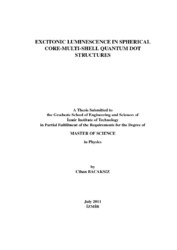Please use this identifier to cite or link to this item:
https://hdl.handle.net/11147/3092Full metadata record
| DC Field | Value | Language |
|---|---|---|
| dc.contributor.advisor | Senger, Ramazan Tuğrul | - |
| dc.contributor.author | Bacaksız, Cihan | - |
| dc.date.accessioned | 2014-07-22T13:50:51Z | - |
| dc.date.available | 2014-07-22T13:50:51Z | - |
| dc.date.issued | 2011 | - |
| dc.identifier.uri | http://hdl.handle.net/11147/3092 | - |
| dc.description | Thesis (Master)--Izmir Institute of Technology, Physics, Izmir, 2011 | en_US |
| dc.description | Includes bibliographical references (leaves: 27-31) | en_US |
| dc.description | Text in English; Abstract: Turkish and English | en_US |
| dc.description | x, 31 leaves | en_US |
| dc.description.abstract | In this thesis, we studied excitonic light emission from core-multishell semiconductor hetero-nanocrystals having a spherically symmetric shape as a function of core size and shell thicknesses. Different combinations of semiconductors were considered in the core/shell/shell structure. The multilayer quantum dot structures that we considered were in A/B/A/B form, where A and B denote II-VI binary semiconductor crystals. We used method of finite differences to solve the Schrödinger equation of the confined exciton problem numerically. Several approximations including the effective mass approximation for the electron and hole masses, and treatment of Coulomb interaction as a perturbation, were employed. Normalized oscillator strengths for optical transitions and coexistence of multiple transitions from a single structure at several frequencies have been investigated. In this study, three different pairs of semiconductors are considered. One of them is (CdSe) ZnS) CdSe) ZnSe), other is (CdSe) CdS) CdSe) CdSe) and third one is (CdTe) ZnS) CdTe) ZnSe). According to our calculation, (CdSe)ZnS)CdSe)ZnSe) structure, when the core radius is 1.51 nm with some different shells combinations, has multi-color emissions from higher frequency to lower frequency in the visible spectrum. (CdSe) CdS) CdSe) CdSe) structure has multi-color emissions when the core radii are 2.02 nm and 2.52 nm yet this structure is the most inefficient structures which we analyse Moreover, multi-color emissions are obtained from the structure (CdTe) ZnS) CdTe) ZnS) when the core radii are 1.29 nm, 1.93 nm, 2.58 nm and 3.23 nm. Also, this structure has nearly white light emission for 3.23 nm core radius with 3 ML ZnS shell and 1 ML CdTe shell, and with 4 ML ZnS shell and 1 ML CdTe shell. | en_US |
| dc.language.iso | en | en_US |
| dc.publisher | Izmir Institute of Technology | en_US |
| dc.rights | info:eu-repo/semantics/openAccess | en_US |
| dc.subject.lcsh | Quantum dots | en |
| dc.subject.lcsh | Luminescence | en |
| dc.title | Excitonic Luminescence in Spherical Core-Multi Quantum Dot Structures | en_US |
| dc.type | Master Thesis | en_US |
| dc.institutionauthor | Bacaksız, Cihan | - |
| dc.department | Thesis (Master)--İzmir Institute of Technology, Physics | en_US |
| dc.relation.publicationcategory | Tez | en_US |
| dc.identifier.wosquality | N/A | - |
| dc.identifier.scopusquality | N/A | - |
| item.openairecristype | http://purl.org/coar/resource_type/c_18cf | - |
| item.languageiso639-1 | en | - |
| item.openairetype | Master Thesis | - |
| item.grantfulltext | open | - |
| item.fulltext | With Fulltext | - |
| item.cerifentitytype | Publications | - |
| Appears in Collections: | Master Degree / Yüksek Lisans Tezleri | |
Files in This Item:
| File | Description | Size | Format | |
|---|---|---|---|---|
| T000905.pdf | MasterThesis | 1.42 MB | Adobe PDF |  View/Open |
CORE Recommender
Page view(s)
202
checked on Mar 31, 2025
Download(s)
74
checked on Mar 31, 2025
Google ScholarTM
Check
Items in GCRIS Repository are protected by copyright, with all rights reserved, unless otherwise indicated.